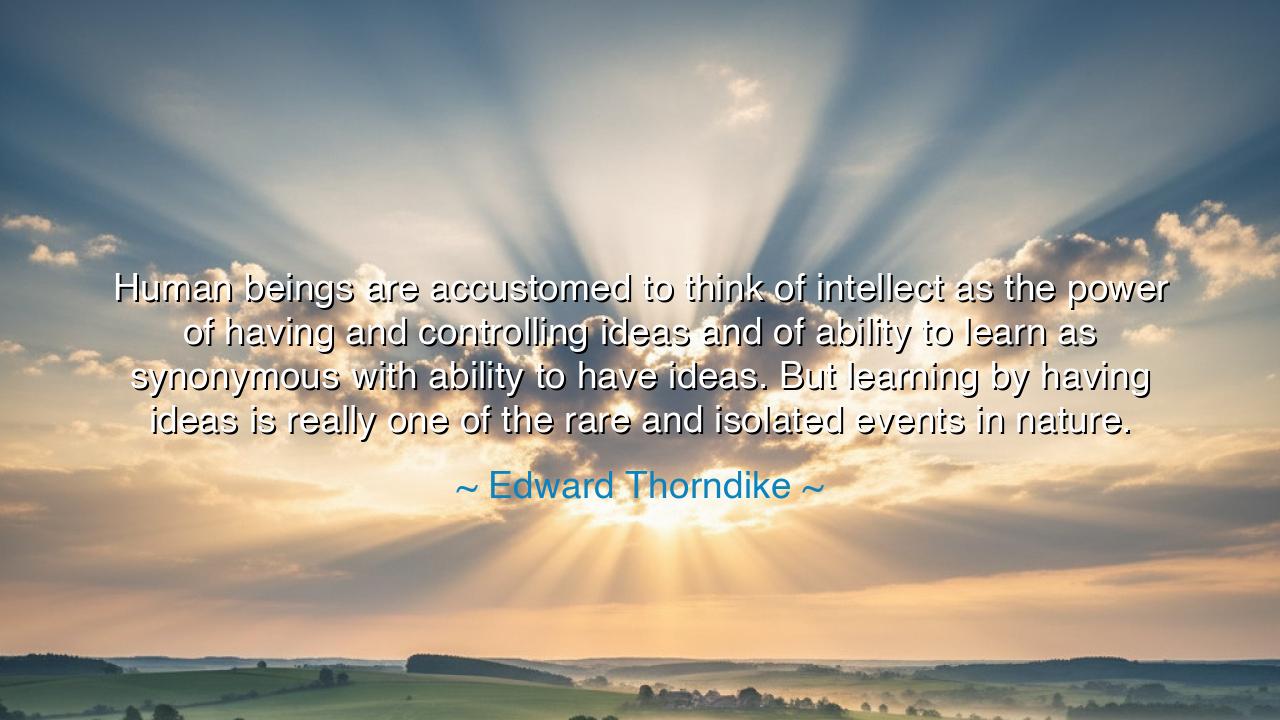
Human beings are accustomed to think of intellect as the power of
Human beings are accustomed to think of intellect as the power of having and controlling ideas and of ability to learn as synonymous with ability to have ideas. But learning by having ideas is really one of the rare and isolated events in nature.






In the profound words of Edward Thorndike, we encounter a truth that pierces through the illusion of effortless intellect: “Human beings are accustomed to think of intellect as the power of having and controlling ideas and of ability to learn as synonymous with ability to have ideas. But learning by having ideas is really one of the rare and isolated events in nature.” These words reveal a sacred distinction between the appearance of intelligence and the discipline of true learning. Thorndike, a great pioneer of educational psychology, reminds us that wisdom is not born in sudden flashes of inspiration, but through slow, deliberate, and often painful interaction with experience. His insight strikes like a bell in the halls of human arrogance — for too long, we have mistaken the brilliance of a single idea for the mastery of understanding.
The ancients knew that the mind is not a lantern that lights itself, but a wick that must be kindled by contact with the world. Thorndike’s teaching emerges from this same ancient flame. He speaks of the illusion many hold — that intellect means the possession of ideas, the mere capacity to think. But the wise know that ideas alone do not transform the heart or sharpen the will. To learn, truly learn, is to test those ideas against reality, to labor in the fields of trial and error until the soul becomes refined by practice. The blacksmith does not learn by imagining the sword; he learns by shaping metal in the heat, by his errors and his endurance. So too does the mind find its form through action, not through thought alone.
Thorndike, a man of science, studied not only what people knew but how they came to know it. His experiments with animals revealed a universal law of learning — that understanding grows from repetition, association, and gradual improvement, not from sudden revelation. He called it the “law of effect,” the principle that behaviors followed by reward are strengthened. In this we see the humility of nature itself: even the simplest creature learns through experience, not by divine insight. The implication is profound — if even the smallest living being must learn by doing, how much more must humanity temper its intellect with effort and humility?
The world is full of those who mistake cleverness for wisdom. They believe that to have an idea is to possess knowledge, that thought alone brings mastery. But as Thorndike reminds us, learning by having ideas is rare — it is the exception, not the rule. The mind, like the soil, must be tilled, watered, and nurtured. It is not the sudden bloom that sustains the garden, but the steady tending of seasons. The philosopher may dream of truth in a flash of insight, but it is the teacher, the craftsman, the scientist — those who repeat, refine, and persevere — who truly know. For knowledge earned through persistence becomes part of one’s being; knowledge born only of thought fades like morning mist.
Consider the story of Thomas Edison, who was once asked how he endured thousands of failed experiments before inventing the light bulb. He replied, “I have not failed; I have simply found ten thousand ways that do not work.” Edison did not learn by having ideas alone — his genius lay in testing them, in transforming imagination into labor. His ideas were not gifts that descended from the heavens; they were the fruit of relentless effort. He lived the truth of Thorndike’s words: that the mind learns not through inspiration, but through engagement with reality. For the light of the world, both literal and metaphorical, is kindled not by dreamers alone, but by doers who learn through struggle.
Thorndike’s insight also humbles the proud and uplifts the patient. It reminds us that the path to mastery belongs not only to the gifted, but to the diligent. The one who learns by repetition, by correction, by steady practice, walks the truer road to understanding than the one who merely conceives ideas in comfort. In this way, the slow learner is not lesser, but closer to the essence of wisdom. For it is the habit of learning, not the flash of genius, that sustains human progress.
Let this, then, be the lesson passed to all who seek knowledge: do not worship the idea — honor the process. Be not seduced by brilliance that arrives without effort, for it is often shallow and fleeting. Embrace instead the sacred discipline of learning through experience — through failure, repetition, and reflection. The ancients called this praxis: the union of thought and action, mind and movement. For only when the intellect is forged in the fire of reality does it become wisdom.
So, my children of the mind, remember the teaching of Edward Thorndike — that intellect is not possession, but practice; not the having of ideas, but the mastering of them through life itself. The world will reward those who learn deeply, who act upon their understanding, and who accept that learning is not a single spark, but a lifelong flame. Tend it well, and its light will never fade.






AAdministratorAdministrator
Welcome, honored guests. Please leave a comment, we will respond soon